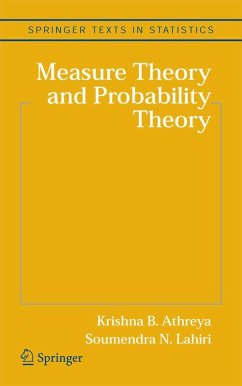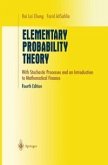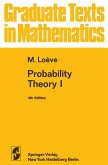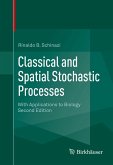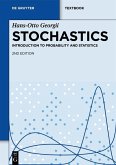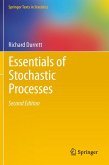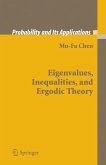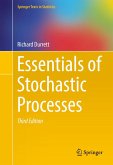This is a graduate level textbook on measure theory and probability theory. The book can be used as a text for a two semester sequence of courses in measure theory and probability theory, with an option to include supplemental material on stochastic processes and special topics. It is intended primarily for first year Ph.D. students in mathematics and statistics although mathematically advanced students from engineering and economics would also find the book useful. Prerequisites are kept to the minimal level of an understanding of basic real analysis concepts such as limits, continuity, differentiability, Riemann integration, and convergence of sequences and series. A review of this material is included in the appendix.
The book starts with an informal introduction that provides some heuristics into the abstract concepts of measure and integration theory, which are then rigorously developed. The first part of the book can be used for a standard real analysis course for both mathematics and statistics Ph.D. students as it provides full coverage of topics such as the construction of Lebesgue-Stieltjes measures on real line and Euclidean spaces, the basic convergence theorems, L^p spaces, signed measures, Radon-Nikodym theorem, Lebesgue's decomposition theorem and the fundamental theorem of Lebesgue integration on R, product spaces and product measures, and Fubini-Tonelli theorems. It also provides an elementary introduction to Banach and Hilbert spaces, convolutions, Fourier series and Fourier and Plancherel transforms. Thus part I would be particularly useful for students in a typical Statistics Ph.D. program if a separate course on real analysis is not a standard requirement.
Part II (chapters 6-13) provides full coverage of standard graduate level probability theory. It starts with Kolmogorov's probability model and Kolmogorov's existence theorem. It then treats thoroughly the laws of large numbers including renewal theory and ergodic theorems with applications and then weak convergence of probability distributions, characteristic functions, the Levy-Cramer continuity theorem and the central limit theorem as well as stable laws. It ends with conditional expectations and conditional probability, and an introduction to the theory of discrete time martingales.
Part III (chapters 14-18) provides a modest coverage of discrete time Markov chains with countable and general state spaces, MCMC, continuous time discrete space jump Markov processes, Brownian motion, mixing sequences, bootstrap methods, and branching processes. It could be used for a topics/seminar course or as an introduction to stochastic processes.
Krishna B. Athreya is a professor at the departments of mathematics and statistics and a Distinguished Professor in the College of Liberal Arts and Sciences at the Iowa State University. He has been a faculty member at University of Wisconsin, Madison; Indian Institute of Science, Bangalore; Cornell University; and has held visiting appointments in Scandinavia and Australia. He is a fellow of the Institute of Mathematical Statistics USA; a fellow of the Indian Academy of Sciences, Bangalore; an elected member of the International Statistical Institute; and serves on the editorial board of several journals in probability and statistics. Soumendra N. Lahiri is a professor at the department of statistics at the Iowa State University. He is a fellow of the Institute of Mathematical Statistics, a fellow of the American Statistical Association, and an elected member of the International Statistical Institute.
The book starts with an informal introduction that provides some heuristics into the abstract concepts of measure and integration theory, which are then rigorously developed. The first part of the book can be used for a standard real analysis course for both mathematics and statistics Ph.D. students as it provides full coverage of topics such as the construction of Lebesgue-Stieltjes measures on real line and Euclidean spaces, the basic convergence theorems, L^p spaces, signed measures, Radon-Nikodym theorem, Lebesgue's decomposition theorem and the fundamental theorem of Lebesgue integration on R, product spaces and product measures, and Fubini-Tonelli theorems. It also provides an elementary introduction to Banach and Hilbert spaces, convolutions, Fourier series and Fourier and Plancherel transforms. Thus part I would be particularly useful for students in a typical Statistics Ph.D. program if a separate course on real analysis is not a standard requirement.
Part II (chapters 6-13) provides full coverage of standard graduate level probability theory. It starts with Kolmogorov's probability model and Kolmogorov's existence theorem. It then treats thoroughly the laws of large numbers including renewal theory and ergodic theorems with applications and then weak convergence of probability distributions, characteristic functions, the Levy-Cramer continuity theorem and the central limit theorem as well as stable laws. It ends with conditional expectations and conditional probability, and an introduction to the theory of discrete time martingales.
Part III (chapters 14-18) provides a modest coverage of discrete time Markov chains with countable and general state spaces, MCMC, continuous time discrete space jump Markov processes, Brownian motion, mixing sequences, bootstrap methods, and branching processes. It could be used for a topics/seminar course or as an introduction to stochastic processes.
Krishna B. Athreya is a professor at the departments of mathematics and statistics and a Distinguished Professor in the College of Liberal Arts and Sciences at the Iowa State University. He has been a faculty member at University of Wisconsin, Madison; Indian Institute of Science, Bangalore; Cornell University; and has held visiting appointments in Scandinavia and Australia. He is a fellow of the Institute of Mathematical Statistics USA; a fellow of the Indian Academy of Sciences, Bangalore; an elected member of the International Statistical Institute; and serves on the editorial board of several journals in probability and statistics. Soumendra N. Lahiri is a professor at the department of statistics at the Iowa State University. He is a fellow of the Institute of Mathematical Statistics, a fellow of the American Statistical Association, and an elected member of the International Statistical Institute.
Dieser Download kann aus rechtlichen Gründen nur mit Rechnungsadresse in A, B, BG, CY, CZ, D, DK, EW, E, FIN, F, GR, HR, H, IRL, I, LT, L, LR, M, NL, PL, P, R, S, SLO, SK ausgeliefert werden.
From the reviews: "...There are interesting and non-standard topics that are not usually included in a first course in measture-theoretic probability including Markov Chains and MCMC, the bootstrap, limit theorems for martingales and mixing sequences, Brownian motion and Markov processes. The material is well-suported with many end-of-chapter problems." D.L. McLeish for Short Book Reviews of the ISI, December 2006 "The reader sees not only how measure theory is used to develop probability theory, but also how probability theory is used in applications. ... The discourse is delivered in a theorem proof format and thus is better suited for classroom ... . The authors prose is generally well thought out ... . will make an attractive choice for a two-semester course on measure and probability, or as a second course for students with a semester of measure or probability theory under their belt." (Peter C. Kiessler, Journal of the American Statistical Association, Vol. 102 (479), 2007) "The book is a well written self-contained textbook on measure and probability theory. It consists of 18 chapters. Every chapter contains many well chosen examples and ends with several problems related to the earlier developed theory (some with hints). ... At the very end of the book there is an appendix collecting necessary facts from set theory, calculus and metric spaces. The authors suggest a few possibilities on how to use their book." (Kazimierz Musial, Zentralblatt MATH, Vol. 1125 (2), 2008) "The title of the book consists of the names of its two basic parts. The book's third part is comprised of some special topics from probability theory. ... The authors suggest using the book in two-semester graduate programs in statistics or a one-semester seminar on special topics. The material of the book is standard ... is clear, comprehensive and 'without being intimidating'." (Rimas NorvaiSa, Mathematical Reviews, Issue 2007 f) "Probabilists have a special relationship to measure theory. ... The style of writing is clear and precise ... . Its wide range of topics and results makes Measure Theory and Probability Theory not only a splendid textbook but also a nice addition to any probabilist's reference library. ... a researcher in need of a reference work, or just somebody who wants to learn some measure theory to lighten up your life, Measure Theory and Probability Theory is an excellent text that I highly recommend." (Peter Olofsson, SIAM Review, Vol. 49 (3), 2007)

